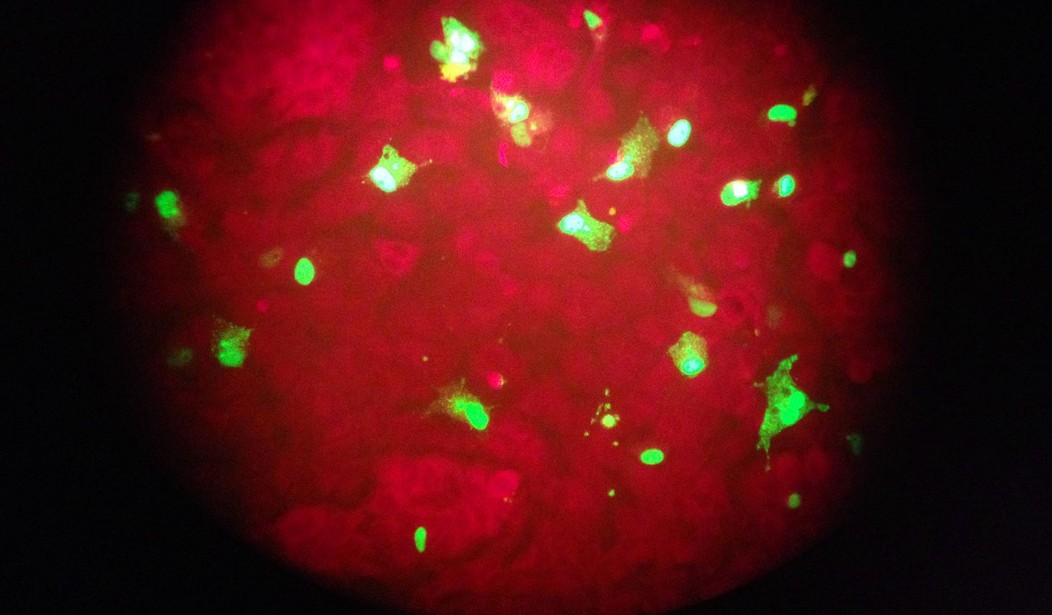Researchers at Harvard have done preclinical studies which show real promise for a cheap nasal spray that could protect humans from most types of flu. The research so far has only involved mice but at that level it worked 99% of the time.
In a paper just published in the peer-reviewed academic journal Advanced Materials, the researchers say the spray “coats the nasal cavity, capturing large respiratory droplets from the air, and serving as a physical barrier against a broad spectrum of viruses and bacteria, while rapidly neutralizing them with over 99.99% effectiveness.” In other words, it catches the viruses and bacteria at the typical point of entry into our bodies — the nose — and stops them there.
There are plenty of caveats. These results came from a study involving mice, not people. The study was conducted in a laboratory, not the outside world. The spray has not gone through the cumbersome process of getting regulated as a medical treatment by the Food and Drug Administration and is instead being sold as a personal-care product. Researchers used a 3D-printed replica of a human nose to test the nasal spray’s efficacy.
So, lots of caveats up front. On the other hand, it seems to work and there's good reason to think it's harmless in humans because the list of ingredients used to create the spray have all already been shown to be harmless in humans.
“The spray, called Pathogen Capture and Neutralizing Spray (PCANS) in the paper, was developed using ingredients from the FDA’s Inactive Ingredient Database (IID), which have been previously used in approved nasal sprays, or from the Generally Recognized as Safe (GRAS) list of the FDA,” said co-senior author Nitin Joshi, an assistant professor of anesthesiology at BWH. “We developed a drug-free formulation using these compounds to block germs in three ways — PCANS forms a gel-like matrix that traps respiratory droplets, immobilizes the germs, and effectively neutralizes them, preventing infection.”...
Experiments in mice showed that a single dose of the PCANS nasal spray could effectively block infection from an influenza virus (PR8) at 25 times the lethal dose. Virus levels in the lungs were reduced by >99.99 percent, and the inflammatory cells and cytokines in the lungs of PCANS-treated animals were normal.
Here's how Dr. Joshi put it:
“We dosed the animals with 25 times the lethal dose of a virus,” says Dr. Nitin Joshi, an assistant professor at BWH and Harvard Medical School. “Before that, we gave some of them a single dose of the Pathogen Capture & Neutralizing Spray. We found that all the treated mice showed complete protection while the untreated mice did not show any benefit.”
All of the mice who got the PCANS treatment survived. All of the ones that did not get it died. Again, it's not humans trials but in this case there doesn't seem to be any sort of unique biochemistry at work. This is a physical barrier that traps and kills viruses and bacteria and keeps them from multiplying and a) spreading to your lungs and b) spreading to other people. You can read the full paper here if you're interested in the details.
Definitely sounds promising but in the trials so far the mice were given the spray a few minutes before being given a dose of virus. The paper describes the spray as providing protection for at least four hours and maybe up to a day before it is fully cleared from the system. So for this to work over time you'd need to use it every day.
What would happen if they took nasal spray a day after a dose with virus? Would it work at all, even if to a lesser degree? I'm thinking most people don't want to walk around all winter using a nasal spray every day as a preventative measure. But many people would probably be willing to use it if they started feeling sick and knew it would help them get rid of the infection more quickly. Something to look at in future research.









Join the conversation as a VIP Member